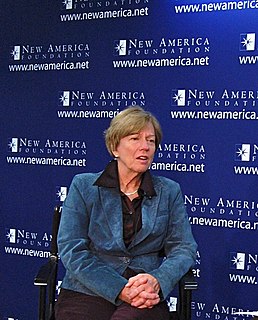Top 405 Genetically Modified Quotes & Sayings
Explore popular Genetically Modified quotes.
Last updated on April 17, 2025.
As we move forward, you cannot resolve the potential food crisis or shortages without science being part of the solution. Science has to be part of the solution but African governments - and these are decisions for governments, whether they embrace or do not embrace genetically modified food - and for the moment, most African companies do not accept genetically modified seeds.
Even very progressive, informed people still get tongue-tied responding to the question, can organic and sustainably raised food still feed the world? A corollary to that question, and one we certainly hear a lot these days, is that genetically modified foods are better for the environment because they use fewer chemicals, which has been thoroughly debunked.
Myths about the dire effects of genetically modified foods on health and the environment abound, but they have not held up to scientific scrutiny. And, although many concerns have been expressed about the potential for unexpected consequences, the unexpected effects that have been observed so far have been benign.
Democrats pride themselves on their commitment to science. Citing climate change, they contend that they are the party of truth, while Republicans are 'denialists.' But with respect to genetically modified organisms, many Democrats seem indifferent to science, and to be practicing a denialism of their own - perhaps more so than Republicans.
We're still promoting stupid wasteful behavior in agribusiness - everything from ethanol production for cars to genetically modified crops. In commerce just about everything we do politically is in the service of WalMart and the systems tied to it. In transportation, we could, for instance, have compelled General Motors to produce railroad rolling stock as a condition of their bail-out, but we didn't do that. Instead, we're chasing the phantom of electric cars - and, believe me, we are going to be mortally disappointed how that works out.
The World Health Organization recently concluded that glyphosate, the main ingredient in the most-used herbicide on GMOs, is "possibly carcinogenic to humans." What's even scarier is that more than 3,200 elementary schools are within 1,000 feet of genetically modified corn or soybean fields. Drift is a very real thing in agricultural communities, so the proximity of these toxic substances to children is terrifying.
There's almost no food that isn't genetically modified. Genetic modification is the basis of all evolution. Things change because our planet is subjected to a lot of radiation, which causes DNA damage, which gets repaired, but results in mutations, which create a ready mixture of plants that people can choose from to improve agriculture.
I'm against the theory of the multinational corporations who say if you are
against hunger you must be for GMO. That's wrong, there is plenty of
natural, normal good food in the world to nourish the double of humanity.
There is absolutely no justification to produce genetically modified food
except the profit motive and the domination of the multinational
corporations.
We are eating hybridized and genetically modified (GMO) foods full of antibiotics, hormones, pesticides, and additives that were unknown to our immune systems just a generation or two ago. The result? Our immune system becomes unable to recognize friend or foe - to distinguish between foreign molecular invaders we truly need to protect against and the foods we eat or, in some cases, our own cells. In Third World countries where hygiene is poor and infections are common, allergy and autoimmunity are rare.
Cows given genetically modified growth hormones make more milk, but have painful swollen udders, have ulcers, joint pain, miscarriages, deformed calves, infertility, and much shorter life spans. Their milk contains blood, pus, tranquilizers, antibiotics, and an insulin growth factor that can cause a fourfold increase in prostate cancer and sevenfold rise in breast cancer. This is the milk used in our school lunch programs and served to our children. This is the milk that you buy every day. This is the milk used in all cheeses, yogurts, butter, and cream.
I would avoid any product that contains genetically modified (GMO) corn, because there are still questions regarding the long-term health effects of genetically altered foods on the human body have not been thoroughly tested. Sugars are also sneaked into tons of different foods, especially foods marketed to kids. Again, study the labels carefully before buying.
I did not want to raise a genetically compromised child. I did not want my children to have to contend with the massive diversion of parental attention, and the consequences of being compelled to care for their brother after I died. I wanted a genetically perfect baby, and because that was something I could control, I chose to end his life.
There are no wild, seedless watermelons. There's no wild cows... You list all the fruit, and all the vegetables, and ask yourself, is there a wild counterpart to this? If there is, it's not as large, it's not as sweet, it's not as juicy, and it has way more seeds in it. We have systematically genetically modified all the foods, the vegetables and animals that we have eaten ever since we cultivated them. It's called artificial selection.
There is broad scienti?c consensus that genetically engineered crops currently on the market are safe to eat. After 14 years of cultivation and a cumulative total of 2 billion acres planted, no adverse health or environmental effects have resulted from commercialization of genetically engineered crops.
The huge arrogance of the companies developing GMO crops and their determination to destroy the line of accountability which links the developer to the product is breath-taking. When something goes wrong, as it inevitably will, there will be a great benefit to those who have taken a stance against genetically modified organisms.
Genetically modified organism (GMO) foods are feared and hated by environmentalists and the public alike. Yet the scientific assessment of GMOs is remarkably different. Every major scientific evaluation of GMO technology has concluded that GMOs are safe for human consumption and are a benefit to the environment.
[The canonization of the Koran involved the] attribution of several, partially overlapping, collections of logia [sayings] (exhibiting a distinctly Mosaic imprint) to the image of a Biblical prophet (modified by the material of the Muhammadan evangelium into an Arabian man of God) with a traditional message of salvation (modified by the influence of Rabbinic Judaism into the unmediated and finally immutable word of God).
Part of what the food industry does with public relations, just like the chemical industry or the oil industry, is to try to erase their fingerprints from their messaging. So when consumers hear about a recent effort like the "food dialogues" put on by a group called the US Farmers and Ranchers Alliance, do they know necessarily that these "dialogues" are being funded by companies like Monsanto, a large chemical company and the controller of most of the patents on genetically modified seeds? No, they don't.
You can be born gay, but not because of your genetics, I think because of your subconscious more than your genetics. I think genetically, we're made to reproduce. We can't survive this route. Genetically, that's the way to go. Genetically, we have to reproduce, but subconsciously, and preferentially, you can be born with that.
The US and UK governments' relentless backing for the global spread of genetically modified seeds was in fact the implementation of a decades long policy of the Rockefeller Foundation since the 1930's, when it funded Nazi eugenics research - i.e. mass-scale population reduction, and control of darker-skinned races by an Anglo-Saxon white elite. As some of these circles saw it, war as a means of population reduction was costly and not that efficient.
We can look at the way of improving the key biochemical processes like photosynthesis itself. A lot of energy is lost to keep the plant cool. So maybe we can think of building plants which are more resistant to heat. Genetically modified plants can be one answer and we can imagine more efficient plants, call them 'energy plants'. And I believe, contrary to what ecologists think, they can still be beautiful plants.
One of the skills of a journalist, though, is to find people who can teach him what he needs to know. So instead of taking courses, I've been very lucky in that I found teachers - scientists, especially - who were willing to teach me what I needed to know, whether it was about genetically modified crops or how photosynthesis works, and so on. I just find my teachers and don't have to pay for my education.














































